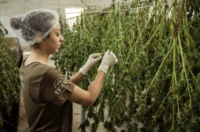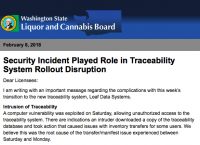One of the biggest challenges that cultivators, processors and distributors face in doing business is the requirement to track the product at every step in the production process, from seed to sale. When you add the wide range of label sizes and requirements across the supply chain, labeling can feel overwhelming. While business systems such as METRC, BioTrack, MJFreeway and others are key, integrating accurate and secure barcode labeling with those systems will streamline the end-to-end process while meeting traceability requirements. Here are some things to consider, no matter what role in the cannabis supply chain you play.
Cultivation: Where Tracking and Labeling Starts

It’s crucial to implement accurate labeling processes from the beginning, whether growing for a customer or your own vertically integrated operation. The cannabis industry is faced with strict labeling regulations for a variety of cannabis products. Start with a labeling system that can integrate with METRC, BioTrack, MJ Freeway or other seed to sale software solutions. Your barcode labeling solution should also include label approval requirements, so you have role-based access and transparency with label changes and print history in case of issues or recalls. Whatever cannabis labeling regulations your business faces, label design software helps you create compliant cannabis labels throughout the supply chain, from grower to consumer.
Radio Frequency Identification (RFID) Labeling
Select regulations require growers to leverage RFID technology to track the location of the plants in their grow houses. RFID technology also enables accurate real-time inventory analysis and helps reduce manual labor costs, as well as errors that can occur with manual counting. To accurately encode RFID tags with variable plant data, be sure you are using a barcode labeling system that can enable easy RFID tag encoding that integrates data from all your business systems. Fastening RFID tags to plants across your grow house floor enables quick and easy location tracking, and RFID reading removes the need for a manual line of sight and allows hundreds of tags to be read at the same time, speeding up shipping and receiving.
Lab Testing
After a plant is cultivated, a certain percentage is sent to a lab to be tested to ensure its proper strain, weight and compound makeup. After your product has been lab tested, leverage the data from your certificate of analysis to accurately display on your cannabis product labels, including:
- Pass/fail chemical testing
- Final date of testing & packaging
- Identification of testing lab
- Cannabinoid profile & potency levels
- Efficiently display lab testing results on product labels with the use of a QR code for the consumer to review the independent lab’s certificate of analysis
Processing and Production: Tracking and Labeling After the Plant Has Been Harvested
A lot of information needs to go on a cannabis label. Whether you’re producing pre-rolls, packaged flower, edibles, beverages, topicals or cartridges, your labeling software must have the capability to create a wide variety of label sizes with barcodes that encode a large volume of data, while also being fully compliant and showing consumer appeal.
Your cannabis labeling software should do the following for you:
- Support database integration to populate variable data from METRC, BioTrack, and other systems
- Import high-resolution artwork and leverage with dynamic barcodes and variable data
- Contain barcode creation wizards for 1D & 2D barcodes
- Automate weigh & print
- RGB/CMYK color matching
- Feature secure label approval processes, label change tracking and print history
- Offer WYSIWYG (What You See is What You Get) printing
- Automatically trigger printing directly from scales and scanners when cannabis is weighed

Integrate labeling with your seed to sale software solution to automatically trigger label printing by an action in your seed to sale system or by monitoring a database. By integrating your label printing system with your seed to sale traceability system, you can expect to minimize errors, increase print speeds and maximize your ROI. Your business system already holds the variable data such as product names, license number, batch or lot codes, allergens, net quantity, cannabis facts, warning statements and more. By systematically sending this data to the right label template at the right time, labeling becomes an efficient and cost-effective process.
Distribution: labeling for consumer and industry demands
The ability to manage and distribute inventory efficiently is critical in the cannabis market. Warehouses and distributors need to ensure proper storage, handling and traceability of product, from the warehouse to the truck.
Leverage your labeling software to easily create:
- Packaging labels
- Shipping labels
- Case & pallet labels
- Inventory labels
If you use the same data for your documents and labels, consider moving document printing into your label design software for greater efficiency. An advanced label creation and integration software enables label and document printing standardization by allowing multiple database records to be on one file. That means when new documents or labels come into your database, your software can seamlessly integrate.
Dispensaries can benefit from integrated seed to sale labeling for traceability, speed to market
Whether you’re a small outlet or a large dispensary, you benefit from integrated barcode labeling that starts from the beginning of the process. How? When barcode labeling software is integrated with seed to sale software, product is fully traced throughout the entire process, from tagging each plant at cultivation to identifying the consumer at point of sale, and accurately communicating that data back to METRC, BioTrack and other critical systems. Some dispensaries do package raw flower onsite, which many times means manually weighing, recording and entering the weight on the label, which is a time consuming and error-prone process. Integrating weigh and print functionality with barcode software enables dispensaries to use the action of weighing raw flower to automatically trigger the label print job. The variable weight is then accurately and automatically populated on cannabis flower package labels, creating an accurate and efficient on-demand labeling process for dispensaries. With efficient labeling processes, time spent creating, correcting, approving and printing labels will be reduced, getting product on the shelves faster.
















